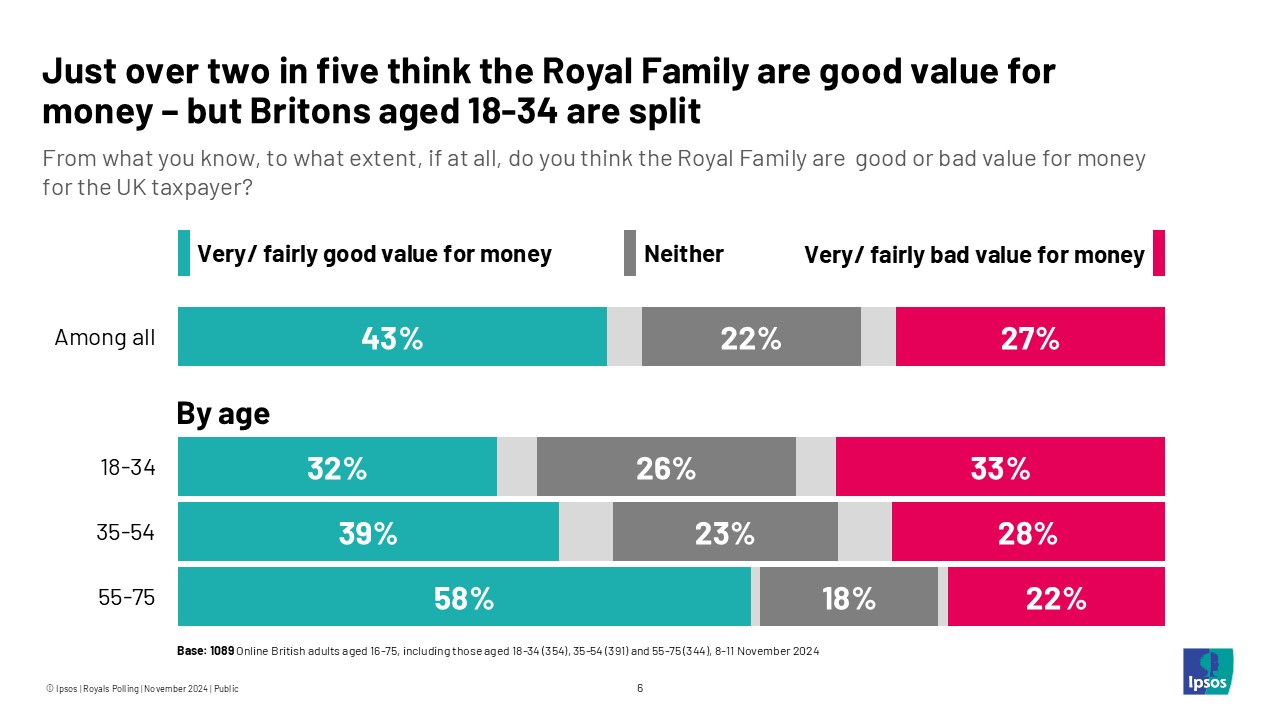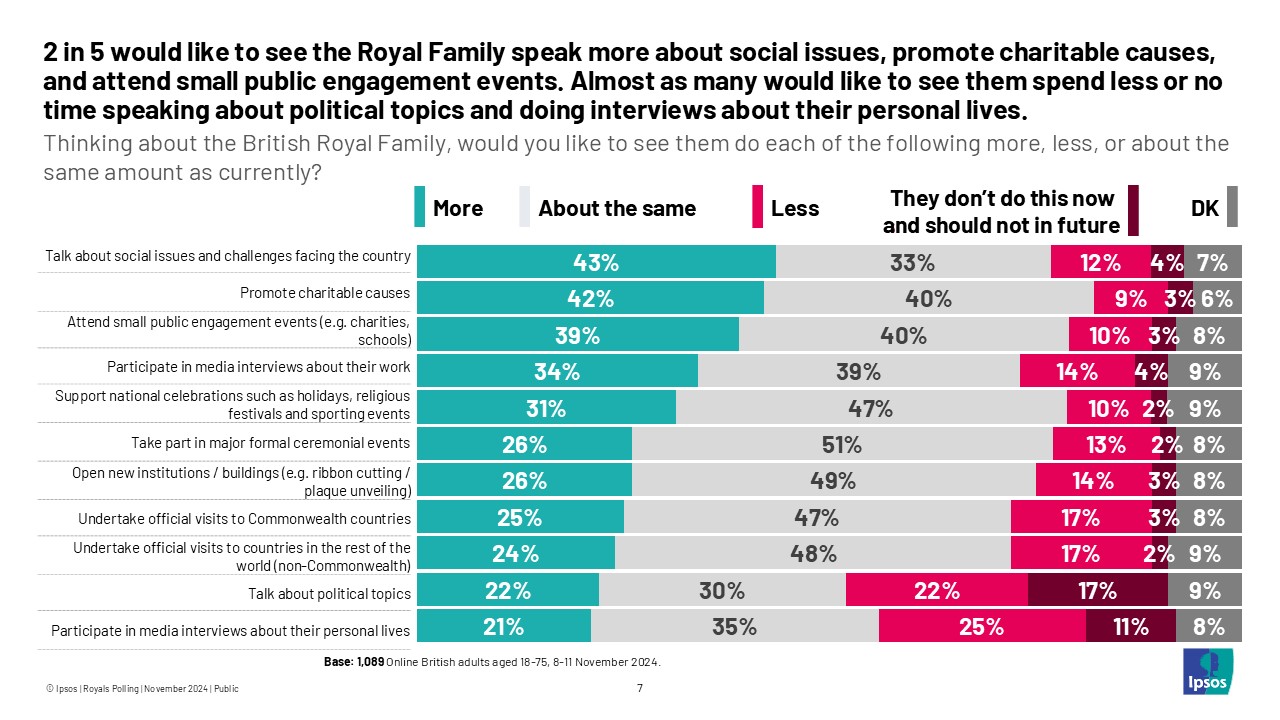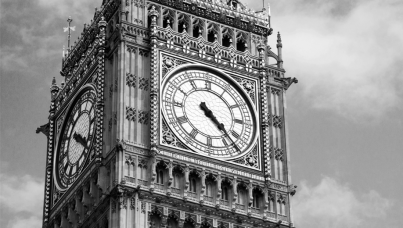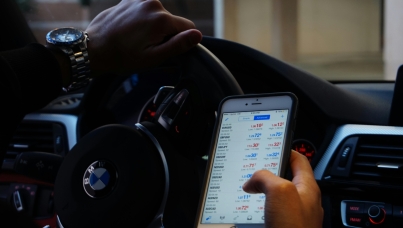Just over two in five think the Royal Family are good value for money – but Britons aged 18-34 are split
Just over two in five think the Royal Family are good value for money – but Britons aged 18-34 are split.
- 43% of Britons overall think the Royal Family are good value for money for the UK taxpayer, compared with 32% of 18–34-year-olds.
- 2 in 5 would like to see the Royal Family speak more about social issues, promote charitable causes, and attend small public engagement events. Almost as many would like to see them spend less or no time speaking about political topics and doing interviews about their personal lives.
- Prince William and Catherine, the Princess of Wales remain the most popular Royals with 65% and 64% holding favourable opinions of them. King Charles and Queen Camilla see small drops in favourability.
- Nevertheless 53% of those surveyed still believe King Charles is doing a good job as King, and two thirds (66%) think Prince William would do a good job.
New research from Ipsos, carried out 8-11 November, examines public opinion in Britain towards the Royal Family.
Value for money
- 43% of Britons overall think the Royal Family are good value for money for the UK taxpayer, more than the 27% who think they are bad value for money.
- 18–34-year-olds are split, with 32% thinking that they are good value for money and 27% disagreeing.
- Those aged 55-75 are more likely to think that the Royal Family are good value for money, with over half (58%) believing they are good value for the UK taxpayer.

Public’s priorities for the Royal Family
- Desire for increased social engagement: 43% of those surveyed want to see the Royal Family increase their focus on social issues and challenges facing the country. A similar percentage want more promotion of charitable causes (42%) and attendance at smaller, local public engagement events such as charities or schools (39%) – in both cases 40% say they want this to stay the same.
- Support for traditional Royal duties: Many want the Royal Family to maintain their current level of involvement in activities such as media interviews about their work (39%), supporting national celebrations (47%), formal ceremonial events (51%), and opening new institutions (49%).
- Less emphasis on politics and personal life: Almost two in five Britons would prefer for members of the Royal Family to spend less (22%) or no (17%) time talking about political issues. A similar proportion want them to spend less (25%) or no (11%) time on media coverage of their personal lives.
- Commonwealth and international visits: The public are broadly content with the current level of official visits. While a quarter favour an increase in visits to both Commonwealth (25%) and other (24%) countries, a larger portion (47% and 48%, respectively) prefer the current level of engagement be maintained.

Popularity of members of the Royal Family
- The Prince and Princess of Wales continue to be the most popular members of the Royal Family. 65% hold a favourable view of the Prince of Wales and 12% unfavourable (net +53). 64% hold a favourable view of the Princess of Wales, and 10% unfavourable (net +54).
- Half of Britons hold a favourable view of the King (51%, down 5ppts since September), with 23% unfavourable (net +28). After a small boost over the summer, this takes him back to levels seen earlier this year. Queen Camilla has also experienced a dip in popularity. 35% are favourable towards her (down 6 ppt from September), with 33% unfavourable (up 6 ppt from September). This gives her a net favourability rating of +2, down from +14 in September.
- Nevertheless over half (53%) of Britons still believe that King Charles III is doing a good job as King. This is down 3 ppt from September.
- Two-thirds (66%) believe that Prince William would do a good job as King.
- Prince Harry and Meghan, the Duchess of Sussex continue to have lower favourability ratings. 30% are favourable towards Prince Harry (up two from September), with 43% unfavourable (net -13). 20% are favourable towards the Duchess of Sussex (down one ppt), with just over half (53%) unfavourable (net -33).
Gideon Skinner, Senior Director of UK Politics at Ipsos said:
Our latest polling reveals both the ongoing positives in public sentiment towards the Royal Family, but also the challenges involved in maintaining it. The core members of the Royal Family continue to be relatively popular, especially the Prince and Princess of Wales, and those who think it should be abolished are in a minority. Two in five Britons (43%) see them as good value, but this dips to 32% among 18–34-year-olds, highlighting a generational divide.
That raises questions of what the Royals need to do to maintain public support and connect with a new generation to ensure their future relevance. When asked what the Royals should be doing in the future, there is some support for Prince William’s recent comments about carrying out his duties with a ‘smaller R in the royal’, with the public favouring more focus on charitable causes and attending smaller public engagement events, while also maintaining traditional duties – whereas people say at least that they aren’t very interested in more details about the Royals’ personal lives. There is also public desire to see them talking more about social issues and challenges facing the country, but this needs to be balanced against opposition towards them straying into the political sphere. Generally appetite for a more active, socially engaged Royal Family is higher among younger people, reflecting the fact that this is the group that feels most undecided towards them at the moment.
Technical note:
- Ipsos interviewed a representative sample of 1,089 adults aged 18-75 across Great Britain. Interviews were conducted by telephone between the 8th-11th November 2024.
- Data are weighted to match the profile of the population. All polls are subject to a wide range of potential sources of error.



